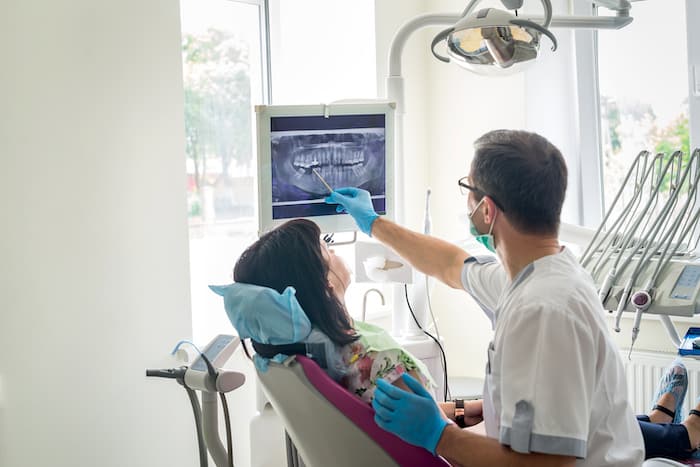Did you know that oral health affects more than just your mouth? Keeping your teeth and gums healthy not only promotes a fabulous smile; it also affects other areas of your body. Poor oral health can increase your risk of gum disease, stroke, heart attack, preterm labor and even diabetes. It is much deeper than just keeping your mouth healthy thanks to the fact that it can be the source of bad bacteria if you don’t prioritize oral hygiene. (Source: https://kellyroaddental.com/)
One of the best ways to stay on top of your oral health and make sure any potential red flags are noticed is to visit the dentist regularly, but what exactly does regular mean? Here we’ll take a look at how often you should go to the dentist, what the dentist will likely do at a check-up and why that is so important for your overall well-being.
It Comes Down to the Individual
One of the most common suggestions you’ll come across is to visit the dentist twice a year, or every six months. For some people, this may be the perfect schedule to follow but, for others, this may be too often or not enough. In deciding the perfect amount of time, it’s important to factor in your medical history and any current conditions, your age, your oral hygiene habits, what you eat and drink and even whether you’re a smoker or not.
If you are a person who smokes daily and has been for years, then it is advisable to go every three months as you’d be in the ‘high risk’ for dental disease category. Other people that tend to be in this high-risk category include:
- Those who have a poor immune response
- Diabetics
- Those with excessive plaque or cavities
- Pregnant women
- Those who suffer from gum disease
- Those whose mouths are dry
- Those who have difficulty swallowing or chewing
- Those who have bad breath
- Those whose jaws lock or pop
Your dentist will be able to consult with you and suggest the best possible schedule. It’s also important to note that your schedule can change over time as your health conditions change. Frazer Dental in Cavan strongly recommends that you go for a check-up and have your teeth cleaned at least once a year. That way, they can spot any dental issues and treat them as quickly as possible to avoid further dental health complications.

What to Expect at Your Yearly Check-Up
Many routine steps will be taken at your regular check-up, all to identify any potential issues. The check-up tends to consist of two main parts which is the check-up itself (the examination) and then usually a teeth cleaning.
During the exam, the dentist will be looking for any signs of gum disease, cavities, the amount of tartar and plaque, and they even check your neck, head, face and throat. If they need to get a better look at potential issues – in particular cavities – then they may also perform x-rays.
The cleaning is meant to get rid of all the plaque and tartar that has built up on your teeth, which is something you can’t do with a regular toothbrush at home. The dentist uses their special tools specifically meant to get rid of the build-up. They will also floss in between your teeth to ensure everything is clean.
You may also be given a fluoride treatment by the dentist. This is done to strengthen your teeth, which means they can better resist the plaque formed by acid and sugars.
What If the Dentist Finds a Cavity?
In doing their check-up, the dentist may identify a cavity. This is something that can’t be ignored so you’ll need to have it addressed either at that appointment if possible, or during a follow-up appointment. Cavities can cause pain in the tooth and your mouth in general, and they can make your tooth very sensitive to hot and cold temperatures.
Cavities can form at any time in life, which is a big part of why it’s so important to visit the dentist regularly. Cavities tend to form when you either don’t brush your teeth properly or aren’t brushing them often enough – in particular after a meal. The food particles that sit on your teeth and remain in your mouth create bacteria, which then turns into plaque on the teeth. This plaque is what eats away at your teeth and causes cavities.
So, when the dentist finds a cavity, they’ll determine the proper cavity treatment for your situation. Some common options include cavity filling, tooth crowning, and root canals. But aside from these cavity treatments, your dentist may also recommend some remedies to get rid of the cavity at home. For example, they may advise you to eat foods rich in vitamin D, use licorice plants, and do other home remedies to avoid more cavities.

The Steps You Can Take to Maintain Good Oral Health
Of course, visiting the dentist regularly is only part of the process, since there are other steps you can and should take to maintain good oral health. The most important steps are:
- Brushing your teeth at least twice a day, preferably after each meal
- Brushing your teeth with a good quality toothbrush and for a long enough period (two minutes is the recommended amount of time)
- Flossing daily, at least once a day
- Replace your toothbrush every three months to ensure it is hygienic
- Use mouthwash that contains fluoride
- Avoid drinking alcoholic drinks and sugary beverages to avoid plaque formation and eventually tooth decay
- Avoid smoking which may cause some periodontal diseases, including oral cancer
- Follow proper diet to prevent the risk of any dental health issues
In making sure you remain healthy and fit, regular visits to the dentist should be included in your schedule. Unless you’re an expert in dentistry, you need a trustworthy dentist to help take care of your oral health always. Hence, if you’re looking for an experienced dental professional like the ones from Maylands Dental Centre in your area, you can search for some options online or ask your loved ones and colleagues for any referrals.
Choose The Right Dentist
Choosing the right oral health expert or dentist for you is crucial to ensure that you won’t end up having troubles due to improper dental placement or teeth whitening procedures. A local dentist, such as a dentist in Caroline Springs, or someone who lives and works in your county or state is a good idea to avoid excuses for missing dental appointments.
It’s important to know the proper credentials of a dentist to choose the best practitioner who will regularly check your dental health. A qualified dentist is a graduate of either a Doctor of Dental Surgery (D.D.S.). Moreover, a dentist can be a graduate of a Doctor of Dental Medicine (D.M.D.). Dental schools usually require a two-year college education before entering a program. However, it’s best if the dentist carries a bachelor’s degree.
Attaining a beautiful smile should be your priority too. Hence, you need a cosmetic dentist who should be licensed (National Board Dental Examination or NBDE). It’s best to also ask about the cosmetic dentist’s experience with performing different cosmetic dental procedures, as well as any additional training or education for such specialization. It’ll even help to find out whether the dentist holds membership to a respected cosmetic dentistry organization.
Takeaway
It’s crucial to visit your dentist if you feel something is wrong with your teeth and gums. But don’t wait until a dental health problem arises. Regular dental checkups may vary from one trusted source to another. Thus, you need to pick the right dentist for your situation. But whoever dental professional you choose generally, people should visit their dentists every six months.
The Editorial Team at Healthcare Business Today is made up of skilled healthcare writers and experts, led by our managing editor, Daniel Casciato, who has over 25 years of experience in healthcare writing. Since 1998, we have produced compelling and informative content for numerous publications, establishing ourselves as a trusted resource for health and wellness information. We offer readers access to fresh health, medicine, science, and technology developments and the latest in patient news, emphasizing how these developments affect our lives.








